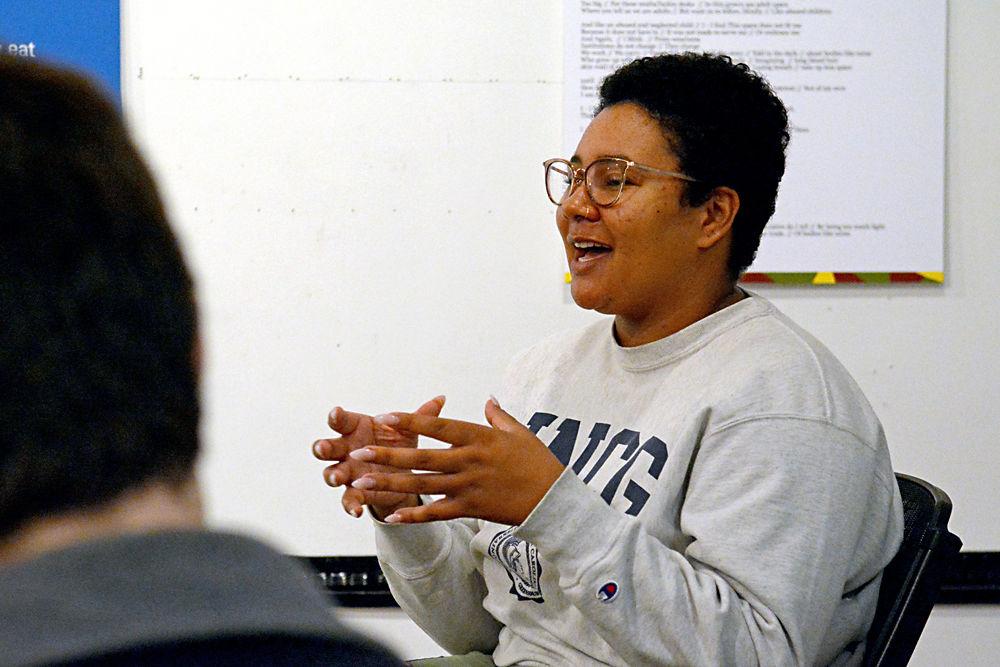Inquiries for how black bodies can navigate white spaces are a core aspect of critical race theory and a large influence for the creation of the “Politicization and Sexualization of Black Bodies” exhibit hosted by the African American Cultural Center. On Thursday, March 21, the Women’s Center put together a seminar to reflect on the exhibit before its closing that evening.
The event, “Mixtape Series: The Political Strategies of Academia that Dismember Black Bodies,” was a facilitated discussion led by Angela Gay, the assistant director of the Women’s Center and one of the creative leads behind the exhibit. During the seminar, participants answered a slew of open-ended questions regarding their identities and placement within academia.
Erin Elliot, a graduate student in educational psychology, is the creator of the Mixtape Series, which she started in the spring of 2018 in partnership with Multicultural Student Affairs. The goal was to provide black graduate students at NC State a way to be heard alongside their undergraduate peers. The title comes from the definition of a mixtape, which is a compilation of music recorded by multiple artists onto a single medium.
“The goal for this specific program was to talk about the ways black bodies are being disembodied in the higher education system,” said Elliot. “Through this, we can transition into how disembodiment occurs for multiple people in [NC State].”
To dismember is defined as cutting off the limbs of persons or animals, and the term was intentionally chosen for this definition. African Americans have had their identities slowly stripped from them through covert acts like public policy, social norms, etc. in order to assimilate them into society without disrupting systems that uphold oppression.
Dani Dalton, a second-year pursuing interdisciplinary studies and student programmer at the Women’s Center, was one of the participants in the seminar.
“The discreteness of the politics of controlling and dismembering people’s bodies is what stood out to me most about this seminar,” said Dalton. “Dismembering is such a strong word that recognizes we have to pick and choose which pieces of ourselves to bring into a space and so many go through that daily.”
Black people have been the main targets of violence from these systems, but any identity that doesn’t fall within abled, cisgender, straight, white or male is subject to attack.
Though small, the seminar consisted of a mixed crowd of undergraduate and graduate students from various racial and cultural backgrounds. While the exhibit was used as a segue into the discussion, it wasn’t required that any participants visited it prior to the seminar, and time was allotted at the start for anyone to quickly look through the pieces.
The floor opened with participants thinking back on how they’ve had to navigate their social settings while sacrificing parts of their identities. Judith Butler’s concept of gender performativity was referenced to explain how many aspects of our identities in academic settings are performed to coincide with social norms.
Social pressure to perform identities deemed acceptable by those in power results in assimilation and covert violence. When we adopt the dominant identity, our peers are likely to ignore the characteristics that cause us to fall outside the norm. This results in their erasure.
Conversations also addressed how to dismantle the systems of oppression, however these were more troublesome. Institutional discrimination is harder to abolish because it’s deeply ingrained within our society and there’s no single entity at fault. Many different groups of people uphold them, often without realizing.
“We want to come together to not only name [oppression], but to do something about it,” said Elliot. “There’s power in naming. If we can’t name these systems, we can’t do anything about them.”
The final portion of the seminar involved the participants redefining themselves and their goals. Each person was asked several questions such as “Who are you?”, “Who are your people?” or “What do you want?” in an attempt to unlearn the things that tell them they can’t identify with certain aspects of themselves.
“We all hold power individually and collectively,” said Gay. “When we fail to see this, we tear ourselves apart.”
Participants also discussed how to build healthy relationships with people they don’t necessarily identify with. When describing their communities, everyone agreed that theirs consisted of people they’re close to or people with shared identities. Everyone mutually agreed they want to develop the ability to expand their communities beyond these qualifications.
“I urge people to share their thoughts and feelings to start conversations on serious matters just like we’re doing here,” said Dalton. “I know it takes so much vulnerability, but it’s crucial because those ideas and emotions they’re experiencing are valid and should be spoken about.”













